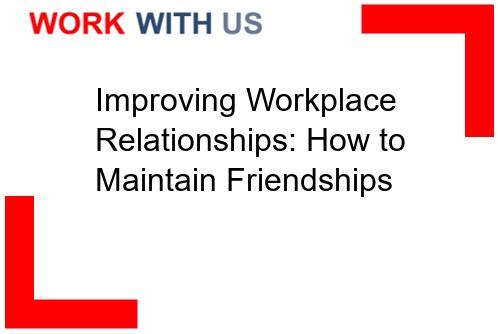Improving Workplace Relationships: How to Foster and Sustain Friendships
In today’s fast-paced and competitive work environment, fostering positive relationships with colleagues has become increasingly important. Building strong workplace friendships not only enhances job satisfaction but also contributes to a more productive and harmonious work environment. However, maintaining these friendships can sometimes be challenging, especially when faced with conflicting priorities and demanding workloads. This article explores effective strategies to improve workplace relationships and offers practical tips on how to sustain friendships amidst professional responsibilities.
First and foremost, open and honest communication serves as the foundation for any successful relationship. In the workplace, it is crucial to establish clear and transparent lines of communication with colleagues. Regularly engaging in meaningful conversations, both professional and personal, can help build trust and understanding. Taking the time to actively listen to others’ perspectives and concerns demonstrates empathy and fosters a sense of camaraderie. By creating an environment where everyone feels heard and valued, individuals can forge deeper connections and strengthen workplace friendships.
Another key aspect of maintaining workplace friendships is finding common ground. Discovering shared interests or hobbies can provide opportunities for colleagues to bond outside of work-related tasks. Participating in team-building activities, such as sports events, volunteering initiatives, or even informal gatherings, can help foster a sense of camaraderie and create lasting memories. By engaging in activities that go beyond the confines of the office, individuals can develop a deeper understanding of their colleagues’ personalities and build stronger relationships.
Furthermore, it is essential to show appreciation and support for colleagues’ achievements and contributions. Recognizing and celebrating each other’s successes not only boosts morale but also strengthens workplace friendships. Simple gestures like offering congratulations, providing constructive feedback, or expressing gratitude can go a long way in fostering positive relationships. By acknowledging and valuing each other’s efforts, individuals create a supportive and encouraging work environment that nurtures friendships.
Additionally, maintaining a healthy work-life balance is crucial for sustaining workplace friendships. It is essential to respect boundaries and avoid encroaching on personal time. While it is natural for friendships to extend beyond the office, it is equally important to recognize the need for personal space and downtime. Encouraging colleagues to prioritize self-care and respecting their need for rest and relaxation helps create a harmonious balance between work and personal life. By understanding and accommodating each other’s needs, individuals can maintain friendships without compromising their well-being.
Lastly, resolving conflicts in a constructive manner is vital for the longevity of workplace friendships. Disagreements and misunderstandings are inevitable, but how they are addressed can make all the difference. Instead of allowing conflicts to fester and strain relationships, individuals should approach them with a solution-oriented mindset. Engaging in open and respectful dialogue, actively seeking compromise, and focusing on finding common ground can help resolve conflicts and strengthen workplace friendships.
In conclusion, improving workplace relationships and maintaining friendships requires effort, understanding, and effective communication. By fostering open and honest communication, finding common ground, showing appreciation, respecting boundaries, and resolving conflicts constructively, individuals can create a positive and supportive work environment. Investing in workplace friendships not only enhances job satisfaction but also contributes to increased productivity and overall well-being. Ultimately, by prioritizing and nurturing these relationships, individuals can create a workplace where friendships thrive, leading to a more fulfilling and successful professional journey.
Building trust and communication: key factors in maintaining workplace friendships
In today’s fast-paced and competitive work environment, fostering strong relationships with colleagues has become increasingly important. Workplace friendships not only contribute to a positive and enjoyable work atmosphere, but they also enhance productivity and job satisfaction. However, maintaining these friendships requires effort, and two crucial factors that play a significant role in their longevity are trust and effective communication.
Trust is the foundation upon which any successful relationship is built, and workplace friendships are no exception. When individuals trust their colleagues, they feel comfortable sharing ideas, seeking advice, and collaborating on projects. Trust creates an environment where individuals can be vulnerable, express their opinions freely, and rely on one another for support. Without trust, workplace friendships can become strained and superficial, hindering the growth and development of both individuals and the organization as a whole.
Effective communication is another vital aspect of maintaining workplace friendships. Clear and open lines of communication foster understanding, prevent misunderstandings, and promote cooperation. When colleagues communicate effectively, they can resolve conflicts, share feedback, and provide constructive criticism. Moreover, effective communication helps build empathy and strengthens the bond between individuals, leading to a deeper and more meaningful connection.
To build trust and enhance communication in the workplace, individuals can employ various strategies. Firstly, active listening is crucial. By actively listening to their colleagues, individuals demonstrate respect and show that they value their opinions. This not only strengthens trust but also encourages open and honest communication. Additionally, being transparent and honest in all interactions helps establish credibility and fosters an environment of trust and authenticity.
Furthermore, it is essential to maintain confidentiality. When colleagues confide in one another, it is crucial to respect their privacy and keep sensitive information confidential. This demonstrates loyalty and reliability, further strengthening trust within the friendship. Similarly, being reliable and following through on commitments is vital. When colleagues can depend on one another, trust is solidified, and the friendship becomes more resilient.
In terms of communication, choosing the right medium is important. While face-to-face conversations are often the most effective, technology has provided various channels for communication, such as email, instant messaging, and video conferencing. Understanding which medium is appropriate for different situations can help facilitate efficient and meaningful communication.
Moreover, individuals should strive to be proactive in their communication. Regularly checking in with colleagues, providing updates, and seeking feedback not only demonstrates interest but also helps maintain a strong connection. Additionally, being mindful of non-verbal cues, such as body language and tone of voice, can help individuals better understand their colleagues’ emotions and intentions, leading to more effective communication.
Building trust and communication in the workplace is a continuous process that requires ongoing effort. It is essential to invest time and energy into nurturing workplace friendships, as they contribute to a positive work environment and overall job satisfaction. By prioritizing trust and effective communication, individuals can cultivate strong and lasting relationships with their colleagues, leading to increased collaboration, productivity, and personal growth.
Navigating conflicts and resolving differences: strategies for strengthening workplace relationships
Navigating conflicts and resolving differences are essential skills for strengthening workplace relationships. In any professional setting, conflicts and differences of opinion are bound to arise due to varying perspectives, personalities, and work styles. However, how these conflicts are managed and resolved can significantly impact the overall dynamics and productivity of a team. By employing effective strategies, individuals can foster a positive work environment, enhance collaboration, and build stronger relationships with their colleagues.
One of the key strategies for navigating conflicts is effective communication. Open and honest communication is crucial in addressing differences and resolving conflicts in the workplace. It is important for individuals to express their concerns, opinions, and perspectives in a respectful manner. Active listening is equally important, as it allows individuals to understand the viewpoints of others and find common ground. By fostering a culture of open communication, teams can create an environment where conflicts are seen as opportunities for growth and understanding, rather than sources of tension and division.
Active Listening: The Key to Understanding
Active listening is a fundamental skill that plays a vital role in resolving conflicts and strengthening workplace relationships. When engaging in active listening, individuals focus their attention on the speaker, seeking to understand their perspective without interrupting or passing judgment. This approach allows for a deeper understanding of the underlying issues and emotions involved in a conflict. By actively listening, individuals can demonstrate empathy and validate the feelings of their colleagues, which can help in finding mutually agreeable solutions.
Seeking Common Ground: Collaboration over Competition
In the face of conflicts, it is important to shift the focus from competition to collaboration. Instead of viewing conflicts as win-lose situations, individuals should strive to find common ground and work towards win-win outcomes. This can be achieved by identifying shared goals and interests, and exploring alternative solutions that address the concerns of all parties involved. By fostering a collaborative mindset, individuals can build stronger relationships and create a sense of unity within the team.
Emotional Intelligence: Managing Emotions in Conflict
Emotional intelligence is another crucial aspect of navigating conflicts and resolving differences. It involves recognizing and managing one’s own emotions, as well as understanding and empathizing with the emotions of others. In conflict situations, emotions can run high, leading to irrational behavior and further escalation. By developing emotional intelligence, individuals can regulate their emotions, remain calm, and approach conflicts with a rational mindset. This allows for more effective problem-solving and reduces the likelihood of conflicts spiraling out of control.
Mediation and Conflict Resolution Techniques
In some cases, conflicts may require the intervention of a neutral third party to facilitate resolution. Mediation can be a valuable tool in such situations. A skilled mediator can help individuals in conflict to communicate effectively, identify underlying issues, and explore potential solutions. Mediation provides a safe and structured environment for open dialogue, allowing for a fair and unbiased resolution. By utilizing mediation and conflict resolution techniques, teams can address conflicts in a constructive manner, fostering understanding and strengthening relationships.
Building a Culture of Respect and Inclusion
Lastly, creating a culture of respect and inclusion is essential for navigating conflicts and resolving differences in the workplace. When individuals feel valued and respected, they are more likely to engage in open and constructive dialogue. Organizations can promote respect and inclusion by fostering diversity, providing training on cultural sensitivity, and encouraging collaboration across different teams and departments. By embracing diversity and promoting inclusivity, organizations can harness the power of different perspectives and experiences, leading to more innovative solutions and stronger workplace relationships.
In conclusion, navigating conflicts and resolving differences is crucial for strengthening workplace relationships. By employing strategies such as effective communication, active listening, collaboration, emotional intelligence, and mediation, individuals can create a positive work environment where conflicts are seen as opportunities for growth and understanding. Building a culture of respect and inclusion further enhances the ability to navigate conflicts successfully. By investing in these strategies, organizations can foster stronger relationships, enhance teamwork, and ultimately improve overall productivity and success.
Balancing personal and professional boundaries: maintaining healthy friendships in the workplace
Maintaining a healthy balance between personal and professional boundaries is crucial when it comes to fostering friendships in the workplace. Building strong relationships with colleagues can enhance job satisfaction, boost productivity, and create a positive work environment. However, it is essential to navigate these friendships with caution to avoid potential pitfalls that may arise from blurring the lines between personal and professional life.
One key aspect of maintaining healthy friendships in the workplace is setting clear boundaries. It is important to establish what is acceptable and what is not in terms of personal discussions, sharing personal information, and engaging in social activities. By clearly defining these boundaries, individuals can ensure that their personal lives do not interfere with their professional responsibilities and vice versa.
Another vital factor in balancing personal and professional boundaries is maintaining professionalism at all times. While it is natural to form close bonds with colleagues, it is crucial to remember that the workplace is primarily a professional setting. This means that individuals should avoid engaging in gossip, spreading rumors, or discussing sensitive personal matters that may create tension or discomfort among coworkers. By upholding professionalism, individuals can preserve the integrity of their friendships while also fostering a healthy work environment.
Furthermore, it is essential to be mindful of the potential impact that personal friendships can have on professional dynamics. While having friends at work can be beneficial, it is important to ensure that these relationships do not create conflicts of interest or favoritism. Individuals should strive to treat all coworkers fairly and equally, regardless of their personal relationships. This can help maintain a sense of fairness and prevent any negative perceptions or tensions within the workplace.
In addition to setting boundaries and maintaining professionalism, effective communication is key to balancing personal and professional friendships. Open and honest communication can help address any concerns or issues that may arise from these relationships. If a situation arises where personal and professional boundaries are being crossed, it is important to address it promptly and respectfully. By openly discussing concerns, individuals can work together to find a resolution that preserves both the friendship and the professional relationship.
Moreover, it is crucial to recognize that not all friendships in the workplace will be long-lasting or extend beyond the professional setting. While some friendships may naturally evolve into lifelong connections, others may remain confined to the workplace. It is important to be realistic and not force friendships outside of the professional context if they do not naturally progress in that direction. Accepting and appreciating the value of workplace friendships, regardless of their longevity, can help individuals maintain a healthy balance between personal and professional boundaries.
Lastly, self-awareness plays a significant role in maintaining healthy friendships in the workplace. Individuals should regularly reflect on their actions and behaviors to ensure they are not crossing any boundaries or compromising their professionalism. Being aware of one’s own actions and their potential impact on others can help prevent misunderstandings or conflicts within the workplace.
In conclusion, balancing personal and professional boundaries is essential for maintaining healthy friendships in the workplace. By setting clear boundaries, maintaining professionalism, communicating effectively, and being self-aware, individuals can foster strong relationships with colleagues while preserving a positive work environment. It is important to remember that workplace friendships can bring numerous benefits, but they should be approached with caution and respect for the professional setting.
Fostering a positive work environment: cultivating lasting friendships for increased productivity
Creating a positive work environment is crucial for fostering lasting friendships among colleagues, which in turn leads to increased productivity. When employees feel a sense of camaraderie and connection with their coworkers, they are more likely to enjoy coming to work, collaborate effectively, and go the extra mile to achieve shared goals. Building and nurturing these friendships requires effort from both individuals and the organization as a whole. By promoting open communication, encouraging team-building activities, and fostering a supportive culture, companies can cultivate an environment where friendships thrive and productivity soars.
Open Communication: The Foundation of Lasting Friendships
Open communication is the cornerstone of any successful relationship, including friendships in the workplace. When employees feel comfortable expressing their thoughts, concerns, and ideas, it creates an atmosphere of trust and mutual respect. This open dialogue allows for the development of deeper connections and understanding among colleagues. Employers can encourage open communication by fostering a culture that values transparency, actively listening to employees’ feedback, and providing platforms for sharing ideas and concerns. Regular team meetings, one-on-one check-ins, and anonymous suggestion boxes are effective tools for promoting open communication and building lasting friendships.
Team-Building Activities: Strengthening Bonds
Team-building activities play a vital role in fostering friendships among coworkers. These activities provide opportunities for employees to interact outside of their usual work tasks, allowing them to get to know each other on a more personal level. Whether it’s a team lunch, a company retreat, or a friendly sports competition, these activities create shared experiences and memories that strengthen the bonds between colleagues. Employers should prioritize organizing regular team-building events to encourage socialization and create a positive work environment. By investing in these activities, companies can foster a sense of belonging and camaraderie among employees, leading to increased productivity and job satisfaction.
Supportive Culture: Empowering Friendships
Creating a supportive culture is essential for cultivating lasting friendships in the workplace. When employees feel supported by their colleagues and superiors, they are more likely to form meaningful connections. A supportive culture can be fostered by promoting collaboration over competition, recognizing and celebrating individual and team achievements, and providing opportunities for professional growth and development. Employers should encourage mentorship programs, where experienced employees can guide and support their colleagues, fostering a sense of community and friendship. Additionally, promoting work-life balance and offering employee assistance programs can further contribute to a supportive culture, allowing employees to feel valued and cared for.
Benefits of Lasting Friendships in the Workplace
Lasting friendships in the workplace offer numerous benefits that extend beyond personal satisfaction. When employees have strong relationships with their coworkers, they are more likely to collaborate effectively, communicate openly, and share knowledge and resources. These friendships also contribute to a positive work environment, reducing stress levels and increasing overall job satisfaction. Moreover, studies have shown that employees with strong social connections at work are more engaged, motivated, and loyal to their organizations. They are also more likely to stay with the company for the long term, reducing turnover rates and saving recruitment costs.
Challenges and Solutions in Fostering Friendships
While fostering friendships in the workplace is beneficial, it can also present challenges. Cliques and exclusionary behavior can hinder the development of inclusive friendships. To overcome these challenges, employers should promote diversity and inclusion initiatives, encourage cross-team collaboration, and provide training on effective communication and conflict resolution. Additionally, creating opportunities for employees to interact outside of work, such as through social events or volunteer activities, can help break down barriers and foster friendships across different departments and levels within the organization.
In conclusion, fostering a positive work environment that cultivates lasting friendships is essential for increased productivity. Open communication, team-building activities, and a supportive culture are key elements in building and nurturing these friendships. The benefits of lasting friendships in the workplace are numerous, including improved collaboration, increased job satisfaction, and reduced turnover rates. While challenges may arise, employers can overcome them by promoting diversity and inclusion, encouraging cross-team collaboration, and providing training on effective communication. By investing in fostering friendships, companies can create a thriving work environment where employees feel valued, connected, and motivated to achieve their best.



